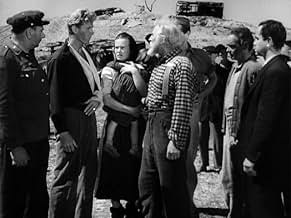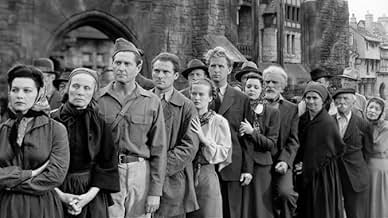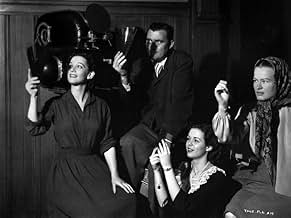Ajouter une intrigue dans votre langueIn the dying days of World War II a German agent infiltrates a recently liberated Belgian town. His aim is to turn them against their Allied liberators.In the dying days of World War II a German agent infiltrates a recently liberated Belgian town. His aim is to turn them against their Allied liberators.In the dying days of World War II a German agent infiltrates a recently liberated Belgian town. His aim is to turn them against their Allied liberators.
- Réalisation
- Scénario
- Casting principal
- Récompenses
- 1 victoire au total
Helen Beverley
- Mrs. Martha Varin
- (as Helen Beverly)
Richard Aherne
- Sergeant Patrick O'Farrell
- (as Richard Nugent)
Ludwig Donath
- Schmidt
- (as Louis Donath)
Gigi Perreau
- Baby
- (as Ghislaine Perreau)
Axel Anderson
- Nazi Officer
- (non crédité)
George Blagoi
- Nazi Officer
- (non crédité)
Sammy Blum
- Alex
- (non crédité)
Avis à la une
Director Biberman is remembered today, if at all, for being one of The Hollywood Ten – film people who defied the House Un-American Activities Committee (HUAC) and ended up in prison: consequently, his career numbered very few films – two ‘B’ thrillers made previous to this and two more (albeit higher-profile) titles after it; I myself had watched the best-regarded of the lot, SALT OF THE EARTH (1954), some time ago.
The two films clearly state where his political sympathies lie – given their celebration of collectivism during periods of turmoil (in the case of THE MASTER RACE, it obviously deals with WWII and, specifically, the ferreting of Nazi criminals and local collaborationists in Belgium once the Allies turn up to liberate the country). Unsurprisingly, all of this gives way to a lot of speechifying – though the war elements render the whole more palatable than was the case with SALT OF THE EARTH (which concerned a prolonged strike at a New Mexico mine-field); the narrative, in fact, throws in everything but the kitchen sink (with plenty of twists and turns along the way) – and, while the characters may come across as stereotypes at times, solidly professional production values (the film was made by RKO at its prime) carry it through.
The cast is modest yet effective – principally George Coulouris in one of his best roles as the Nazi Colonel (the film starts off with him disbanding his chain of command when it becomes clear that the Germans were losing the war) who passes himself off as the patriotic brother of a traitor who has been executed (in this respect, it’s the Hollywood equivalent of Britain’s WENT THE DAY WELL? [1942]). The latter’s surviving wife and daughter are having a hard time coping with this fact, being themselves under a cloud of suspicion – and the German is thus able to observe both sides with relative ease (since he obviously now professes to denounce Nazism, while at the same time rousing gullible locals into resisting the Allies’ help by making them out to be just another group of tyrants!). The more prominent among the ranks of the latter are Stanley Ridges as the American Major in command of the country’s reconstruction and Carl Esmond as a rugged but cheerful Russian officer with medical experience.
One other important female character is that played by Osa Massen, a local girl who succumbed to the advances of a German officer – a relationship which has even produced a child – while her fiancé and brother (Lloyd Bridges, himself in love with the niece of the man Coulouris has replaced!) went to war. There’s much conflict and heartache at the core of such sensitive issues – but understanding, forgiveness and hope for the future eventually prevail. Incidentally, we also get a repentant Nazi (now being held in the same concentration camp where the Belgians had been incarcerated not long before) and it is he who brings about Coulouris’ downfall; the latter had already committed murder and also ordered the destruction of the prison, ostensibly as an act of retribution against the Nazis but really to blame the locals for it – thus causing discord between them and the Allies! The film remains interesting today for its uncompromising and intimate look at the ravages of war, made with relatively few concessions to Hollywood conventions – displaying instead courage, conviction and a passion rarely felt in this type of genre offering.
The two films clearly state where his political sympathies lie – given their celebration of collectivism during periods of turmoil (in the case of THE MASTER RACE, it obviously deals with WWII and, specifically, the ferreting of Nazi criminals and local collaborationists in Belgium once the Allies turn up to liberate the country). Unsurprisingly, all of this gives way to a lot of speechifying – though the war elements render the whole more palatable than was the case with SALT OF THE EARTH (which concerned a prolonged strike at a New Mexico mine-field); the narrative, in fact, throws in everything but the kitchen sink (with plenty of twists and turns along the way) – and, while the characters may come across as stereotypes at times, solidly professional production values (the film was made by RKO at its prime) carry it through.
The cast is modest yet effective – principally George Coulouris in one of his best roles as the Nazi Colonel (the film starts off with him disbanding his chain of command when it becomes clear that the Germans were losing the war) who passes himself off as the patriotic brother of a traitor who has been executed (in this respect, it’s the Hollywood equivalent of Britain’s WENT THE DAY WELL? [1942]). The latter’s surviving wife and daughter are having a hard time coping with this fact, being themselves under a cloud of suspicion – and the German is thus able to observe both sides with relative ease (since he obviously now professes to denounce Nazism, while at the same time rousing gullible locals into resisting the Allies’ help by making them out to be just another group of tyrants!). The more prominent among the ranks of the latter are Stanley Ridges as the American Major in command of the country’s reconstruction and Carl Esmond as a rugged but cheerful Russian officer with medical experience.
One other important female character is that played by Osa Massen, a local girl who succumbed to the advances of a German officer – a relationship which has even produced a child – while her fiancé and brother (Lloyd Bridges, himself in love with the niece of the man Coulouris has replaced!) went to war. There’s much conflict and heartache at the core of such sensitive issues – but understanding, forgiveness and hope for the future eventually prevail. Incidentally, we also get a repentant Nazi (now being held in the same concentration camp where the Belgians had been incarcerated not long before) and it is he who brings about Coulouris’ downfall; the latter had already committed murder and also ordered the destruction of the prison, ostensibly as an act of retribution against the Nazis but really to blame the locals for it – thus causing discord between them and the Allies! The film remains interesting today for its uncompromising and intimate look at the ravages of war, made with relatively few concessions to Hollywood conventions – displaying instead courage, conviction and a passion rarely felt in this type of genre offering.
Herbert Biberman (1900-1971) is the writer and director of this 1944 film. Biberman was a member of the left wing theatre group in New York City and was married to Gale Sondergaard. Both Biberman and Sondergaard were victims of the HUAC "red scare" – Biberman served time in prison and both were blacklisted.
This was his third film as director, fifth as a writer.
Lloyd Bridges (1913-1998) has a minor role in the film. Bridges too was briefly blacklisted but turned around and would be a staunch right wing presence.
(Doc) Robert Golden produced the film. He also produced "Hitler's Children" (1943) which was directed by Edward Dmytryk, another director imprisoned during the HUAC trials. "Hitler's Children" was the most successful film for RKO, even surpassing King Kong, and led to this film being made.
From the film there aren't many obvious communist themes, but there is a sympathetic Russian soldier and there is a lot of emphasis on people working together. The film is ardently anti-Nazi.
George Coulouris (1903-1989) gives the best performance of his career. Osa Massen (1914-2006) is excellent.
This was his third film as director, fifth as a writer.
Lloyd Bridges (1913-1998) has a minor role in the film. Bridges too was briefly blacklisted but turned around and would be a staunch right wing presence.
(Doc) Robert Golden produced the film. He also produced "Hitler's Children" (1943) which was directed by Edward Dmytryk, another director imprisoned during the HUAC trials. "Hitler's Children" was the most successful film for RKO, even surpassing King Kong, and led to this film being made.
From the film there aren't many obvious communist themes, but there is a sympathetic Russian soldier and there is a lot of emphasis on people working together. The film is ardently anti-Nazi.
George Coulouris (1903-1989) gives the best performance of his career. Osa Massen (1914-2006) is excellent.
This is an important example of how film can be used for political and social propaganda, as well as a splendid example of an anti-fascist movie. It's not a great film and it makes no efforts to hide its political leanings - there's nothing subtle at all about the message it is delivering, the message that fascists aren't completed defeated and continue to undermine peace-building and social cohesion. I think that, any time before 2016, I would have found the film cartoonish and silly and melodramatic to the point of ridicule. But post November 2016, I look at the film so incredibly differently, as a film that, in fact, warns quite appropriately about extremism, about devaluing those different from ourselves... this film is important.
Set in the near future following Germany's surrender - which probably qualifies it as science fiction - 'The Master Race' was made when being anti-Nazi wasn't yet deemed to be unAmerican and it was still believed that former Nazis were just waiting their chance to stage a comeback.
Representing a key credit for director Herbert J. Biberman, later to be blacklisted as one of the Hollywood Ten - Philip Dorn's portrayal of a noble Russian probably didn't help - and hailing from the days when George Coulouris was playing Nazis in Hollywood, 'The Master Race' contains an early expression of the belief that later became a Marxist commonplace that social forces not individuals decided political outcomes and that Hitler was just the puppet of vested financial interests; made overt by the opening scene when Coulouris glances at a portrait of his erstwhile Fuhrer and says "In defeat he has no value. They can have him...!"
Representing a key credit for director Herbert J. Biberman, later to be blacklisted as one of the Hollywood Ten - Philip Dorn's portrayal of a noble Russian probably didn't help - and hailing from the days when George Coulouris was playing Nazis in Hollywood, 'The Master Race' contains an early expression of the belief that later became a Marxist commonplace that social forces not individuals decided political outcomes and that Hitler was just the puppet of vested financial interests; made overt by the opening scene when Coulouris glances at a portrait of his erstwhile Fuhrer and says "In defeat he has no value. They can have him...!"
Interesting and original central plot, more than negated by over-the-top propaganda and preachiness.
1944 and the Allies are pushing the Germans back on all fronts. In a last-ditch attempt to prolong the Third Reich and impose their will upon the world, the Nazis come up with a diabolical plan. Agents are sent to soon-to-be-liberated towns with the intention of blending in with the local population and turning them against the Allied liberators. One such agent is Colonel Frederick Von Beck. His aim is to sow seeds of distrust and revolution among the inhabitants of a small Belgian town.
Very original central plot, giving the movie heaps of potential. However, unfortunately, the year of release gives away how things develop from there. Being made during WW2 meant this was going to be a propaganda film. This doesn't have to be the death knell for a film - it is possible to make a propaganda film that remains watchable decades after the war has ended.
Unfortunately, this is not an example of such a movie. Incredibly one-dimensional and heavy-handed in its propaganda, there is no subtlety here. The Germans are evil to the nth degree. Even the Russians are portrayed as angels - anything for the war effort. Quite over-the-top in the extremeness of the propaganda.
This isn't the worst of it. A stark black-and-white good vs evil film could still have been entertaining. However, there's really not much action. Instead, we have speeches upon speeches, none of which say anything new or edifying - it's all stuff we already know: the Nazis are bad, fascism is bad, people need to be free, etc. Yet, every chance is grabbed to jam in a speech. What should have been one line in a dialogue turns into a several-minute monologue.
It's all so tedious and preachy.
Very original central plot, giving the movie heaps of potential. However, unfortunately, the year of release gives away how things develop from there. Being made during WW2 meant this was going to be a propaganda film. This doesn't have to be the death knell for a film - it is possible to make a propaganda film that remains watchable decades after the war has ended.
Unfortunately, this is not an example of such a movie. Incredibly one-dimensional and heavy-handed in its propaganda, there is no subtlety here. The Germans are evil to the nth degree. Even the Russians are portrayed as angels - anything for the war effort. Quite over-the-top in the extremeness of the propaganda.
This isn't the worst of it. A stark black-and-white good vs evil film could still have been entertaining. However, there's really not much action. Instead, we have speeches upon speeches, none of which say anything new or edifying - it's all stuff we already know: the Nazis are bad, fascism is bad, people need to be free, etc. Yet, every chance is grabbed to jam in a speech. What should have been one line in a dialogue turns into a several-minute monologue.
It's all so tedious and preachy.
Le saviez-vous
- Anecdotes"Lux Radio Theater" broadcast a 60 minute radio adaptation of the movie on Januray 15, 1945 with George Coulouris and Helen Beverley reprising their film roles.
- GaffesThe British officer Captain William Forsythe gives a palm down American style salute.
- Citations
Senior Lt. Andrei Krestov: I'm a doctor. or I was. and I can play the mouth fork.
Major Phil Carson: I was afraid of that.
- ConnexionsFeatured in Hollywood the Golden Years: The RKO Story: Dark Victory (1987)
Meilleurs choix
Connectez-vous pour évaluer et suivre la liste de favoris afin de recevoir des recommandations personnalisées
Détails
- Date de sortie
- Pays d’origine
- Langue
- Aussi connu sous le nom de
- La raça suprema
- Lieux de tournage
- Société de production
- Voir plus de crédits d'entreprise sur IMDbPro
- Durée1 heure 35 minutes
- Couleur
- Rapport de forme
- 1.37 : 1
Contribuer à cette page
Suggérer une modification ou ajouter du contenu manquant

Lacune principale
By what name was The Master Race (1944) officially released in India in English?
Répondre
































